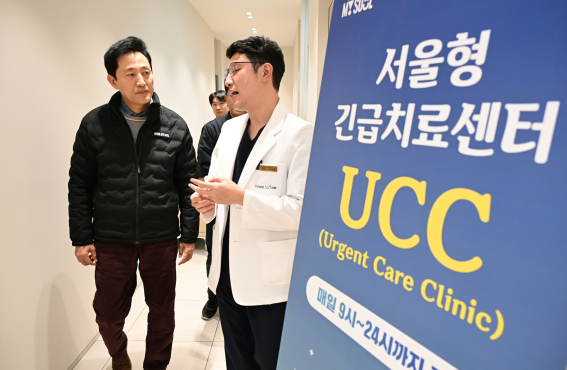The Seoul Metropolitan Government will designate and operate urgent care centers for mildly ill patients and disease-specific hospitals, as the prolonged government-doctoral conflict has made it difficult for them to receive quick treatment at emergency rooms.
The City Hall said Monday that it would start operating two “Urgent Care Clinics” where mildly ill patients can receive emergency care on nights and holidays and four “Disease-Specific Hospitals.”
The SMG’s move aims to reduce emergency room congestion while increasing access to medical care for minor illnesses.
“People who suddenly get sick or injured on nights and holidays and need urgent medical care have had difficulty receiving emergency room treatment due to their mild illnesses. Now, they can confidently visit these hospitals,” the Seoul Metropolitan Government said. “We will thoroughly protect the lives and health of Seoul residents by increasing access to medical care for mild illnesses and reducing emergency room congestion.”

Doctors will staff the Seoul-type urgent care centers daily from 9 a.m. to 24 p.m. The plan is to expand the number of urgent care centers yearly, starting with the currently designated ones – The Healthy 365 Medical Clinic and Seoul Seok Hospital.
The urgent care centers will treat patients who visit the hospital and those who are transported by 119 ambulances. They focus on acute illnesses, including trauma, abdominal pain, cough, high fever, and vomiting, which are the main reasons minor patients visit emergency rooms.
If a patient's symptoms do not improve after first aid treatment at the urgent care center or if they are diagnosed as serious patients, they will be transferred to a nearby tertiary medical institution.
The Seoul-type disease-specific hospitals will operate as 24-hour hospitals for trauma patients. It aims to provide timely treatment for patients with limited access to emergency departments due to a shortage of doctors and a lack of backup care.
This year, the city designated four hospitals for surgical diseases—One Top Hospital, Seoul Yonsei Hospital, Seoul Prime Hospital, and Leaders Rehab Center—and plans to expand to other diseases, such as ophthalmology, obstetrics, and gynecology.
At least one doctor will staff the Seoul-type disease-specific hospitals, treat trauma emergencies, and perform emergency surgeries on inpatients and patients transported by 119 ambulances.
It will also establish an “integrated trauma network” with the National Medical Center to transfer all patients whose symptoms worsen after receiving medical treatment or who are diagnosed as critically ill.
“We will be able to solve the urgent situation of emergency patients through dedicated disease-specific centers for severely ill patients and urgent care centers,” Seoul Mayor Oh Se-hoon said. “We will study the effectiveness of urgent care centers and consider increasing the number of institutions.”

